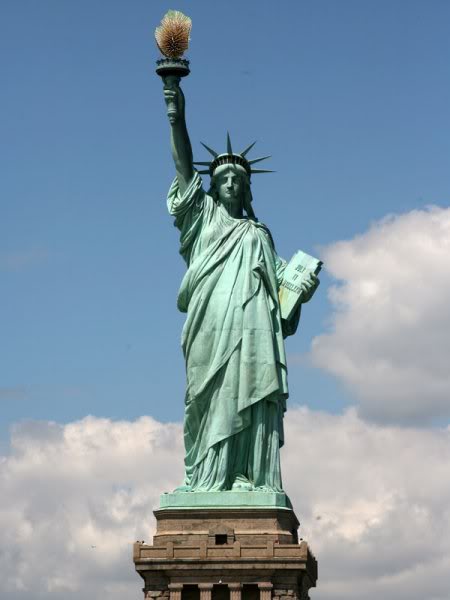
Source:Wikipedia– Lady Liberty: who says it’s a man’s world?
“Broadly speaking, liberty is the ability to do as one pleases, or a right or immunity enjoyed by prescription or by grant (i.e. privilege).[1] It is a synonym for the word freedom. In modern politics, negative liberty is understood as the state of being free within society from control or oppressive restrictions imposed by authority on one’s way of life, behavior, or political views.[2][3][4] Whereas, positive liberty is understood as the possession of the power and resources to act in an environment that overcomes the inequalities that divide us.[5]
In philosophy, these distinctions between negative liberty and positive liberty require distinctions about the causative links that distinguish free will from determinism.[6][5]
In theology, liberty is freedom from the effects of “sin, spiritual servitude, [or] worldly ties”.[7] Sometimes liberty is differentiated from freedom by using the word “freedom” primarily, if not exclusively, to mean the ability to do as one wills and what one has the power to do; and using the word “liberty” to mean the absence of arbitrary restraints, taking into account the rights of all involved[citation needed]. In this sense, the exercise of liberty is subject to capability and limited by the rights of others.[8] Thus liberty entails the responsible use of freedom under the rule of law without depriving anyone else of their freedom. Freedom is broader in that it represents a total lack of restraint or the unrestrained ability to fulfill one’s desires[citation needed]. For example, a person can have the freedom to murder, but not have the liberty to murder, as the latter example deprives others of their right not to be harmed[citation needed]. Liberty can be taken away as a form of punishment. In many countries, people can be deprived of their liberty if they are convicted of criminal acts[citation needed].
The word “liberty” is often used in slogans, such as “life, liberty, and the pursuit of happiness”[9] or “Liberty, Equality, Fraternity”.[10]
Liberty originates from the Latin word libertas, derived from the name of the goddess Libertas, who, along with more modern personifications, is often used to portray the concept, and the archaic Roman god Liber.”
From Wikipedia
“Positive liberty is the possession of the power and resources to act upon one’s free will in the context of the broader society which places limitations on a person’s ability to act, as opposed to negative liberty, which is freedom from external restraint on one’s actions.[1] [2]
As Heyman notes, it is important to understand Isaiah Berlin’s two definitions of liberty in the context of the ideological circumstances of the 1950’s, so a conception of positive liberty includes freedom from external constraints, leading to an understanding of positive liberty in the context of human agency.[3] According to Charles Taylor, Positive liberty is the ability to fulfill one’s purposes. Negative liberty is the freedom from interference by others. [4]
The concepts of structure and agency are central to the concept of positive liberty because in order to be free, a person should be free from inhibitions of the social structure in carrying out their free will. Structurally, classism, sexism, ageism, ableism and racism can inhibit a person’s freedom. As positive liberty is primarily concerned with the possession of sociological agency, it is enhanced by the ability of citizens to participate in government and have their voices, interests, and concerns recognized and acted upon.
Isaiah Berlin’s essay “Two Concepts of Liberty” (1958) is typically acknowledged as the first to explicitly draw the distinction between positive and negative liberty.”
From Wikipedia
“Negative liberty is freedom from interference by other people. Negative liberty is primarily concerned with freedom from external restraint and contrasts with positive liberty (the possession of the power and resources to fulfil one’s own potential). The distinction was introduced by Isaiah Berlin in his 1958 lecture “Two Concepts of Liberty”.
From Wikipedia
This blog is called The FreeState for a very good reason: I’m a big believer in the concept of the free society, which is what you get from a liberal democracy.
I’m not talking about chaos or anarchy, or creating some freedom for people to either hurt innocent people (intentionally or otherwise) or the freedom for people to do as they choose and leave the negative consequences for their decisions onto to others. But the freedom for people to act on their own, to chart their own course in life, to act and think on their own behalf, and then have to deal with the consequences of all their decisions on their own.
So I guess according to Wikipedia at least, I’m in favor of what’s called negative liberty. But in a truly free society where the people are not only free to act and think of their own behalf’s, that society would also be an educated society where everyone, or most of the people have the information and intelligence to make their own decisions and then have to live with the consequences of their own decisions on their own. And I believe that’s positive liberty because you have intelligent, free people, acting and thinking on their own, without having to have a big government trying to run the people’s lives for them.

